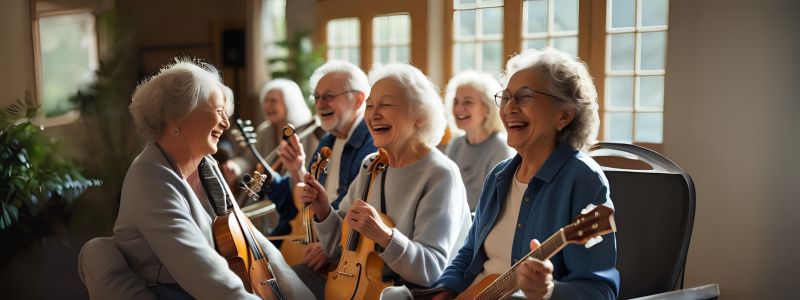
Engaging in new learning activities can reduce the risk of dementia by up to 30 percent, demonstrating that personal development in later life offers measurable health gains from the first lesson. You’ll discover how continuous education bolsters brain health, fosters social connection, and enriches emotional fulfillment while reviewing practical pathways for seniors and their families.
This guide will explore cognitive benefits, social and emotional well-being, available learning formats, the role of senior care solutions, actionable tips for families, holistic impacts on quality of life, and answers to the most common questions about aging and education. Along the way, AgeWell Now’s role as a provider of expert resources for senior care decisions will ensure you can find supportive environments that encourage lifelong learning and personal growth.
Cognitive Benefits of Lifelong Learning for Seniors
Lifelong learning refers to ongoing, voluntary, and self-motivated pursuit of knowledge that supports cognitive reserve by stimulating neural pathways and preserving mental agility through practice in new skills. For example, enrolling in a foreign language course engages memory recall and problem-solving networks, maintaining sharper thinking as you age. Understanding these mental mechanisms sets the stage for deeper insights into memory enhancement, neuroplasticity, and dementia risk reduction.
Cognitive Benefits of Lifelong Learning
Engaging in continuous learning activities can lead to improved memory and enhanced problem-solving skills in older adults. These activities stimulate neural pathways and help maintain mental agility as people age.
Improving Memory and Brain Function in Older Adults Through Learning
Learning new tasks stimulates synaptic connectivity by promoting growth of dendrites and strengthening communication between neurons, which directly enhances memory encoding and retrieval in older adults.
Below is a comparison of common learning activities and their impact on brain performance:
| Activity | Mechanism | Outcome |
|---|---|---|
| Language Learning | Engages hippocampal networks through vocabulary | Improved short-term and long-term recall |
| Puzzle Solving | Activates prefrontal cortex via problem-solving | Enhanced executive function and focus |
| Music Lessons | Synchronizes auditory and motor circuits | Better processing speed and attention |
These activities illustrate how specific learning tasks engage distinct neural pathways, enhancing memory and overall brain performance, which leads us to examine how the aging brain adapts through neuroplasticity.
Neuroplasticity and Its Effects on Aging Brains
Neuroplasticity describes the brain’s capacity to reorganize itself by forming new neural connections, allowing seniors to acquire skills and adapt to change even in later life.
Bullet points below highlight key neuroplastic processes in older adults:
- Myelination adjustments strengthen signal transmission, supporting faster information processing.
- Growth of new synapses encourages flexibility in thought patterns and problem solving.
- Reallocation of cortical resources compensates for age-related decline in specific regions.
These adaptive processes reinforce cognitive resilience and create the foundation for reducing dementia risk through sustained mental engagement.
Reducing the Risk of Cognitive Decline and Dementia Through Lifelong Learning
Lifelong learning reduces risk of cognitive decline by building a robust cognitive reserve that compensates for age-related neural loss and pathology. Key factors include:
- Neural Maintenance – Regular mental challenges preserve synaptic density.
- Reserve Enhancement – Diverse learning experiences expand compensatory networks.
- Stress Reduction – Engaging activities lower cortisol, protecting hippocampal neurons.
Strengthening these factors translates into measurable protection against memory loss and dementia, underscoring the link between continued education and long-term brain health.
Enhancing Social and Emotional Well-Being in Later Life Through Learning

Learning activities foster social connections and emotional balance by creating shared experiences, building confidence, and providing creative outlets that enrich life purpose. Recognizing these holistic impacts reveals why education forms the backbone of personal development in later years.
Fostering Social Engagement for Seniors Through Learning
Group classes, study circles, and workshop cohorts promote social engagement by offering structured opportunities for collaboration and conversation. Typical settings include:
- Local community college courses with discussion groups.
- Art workshops that involve peer critiques and exhibitions.
- Volunteer-led book clubs sharing diverse perspectives.
By participating in these environments, seniors strengthen friendships and reduce feelings of isolation, paving the way to discovering new purpose through education.
Finding New Purpose and Meaning in Retirement Through Education
Educational pursuits supply a clear sense of direction by aligning subjects of interest with achievable milestones, such as obtaining certificates or leading peer-led seminars. Structured learning:
- Encourages goal setting through curricula and assessments.
- Cultivates mentorship opportunities with younger learners.
- Enables community contribution by sharing acquired expertise.
These elements translate knowledge into purposeful roles, reinforcing self-esteem and guiding seniors toward meaningful engagement.
Emotional Benefits of Creative and Artistic Learning Activities
Creative learning nurtures emotional well-being by providing safe channels for self-expression, stress relief, and mood regulation. The table below illustrates how various artistic activities support emotional health:
| Activity | Emotional Benefit | Example |
|---|---|---|
| Painting | Enhanced self-expression | Senior artist showcasing a gallery |
| Music Therapy | Reduced anxiety | Group drumming for stress release |
| Dance Classes | Elevated mood through movement | Social dance sessions with peers |
Engaging in these creative practices supports emotional expression and mood regulation, demonstrating that artistic learning serves as a powerful tool for emotional resilience.
Available Learning Opportunities for Older Adults
Seniors can choose from a diverse array of educational formats—online courses, community programs, workshops, and hobby groups—all designed to match varying interests, schedules, and accessibility needs. These pathways ensure that every learner finds the right environment for personal growth.
Online Learning Platforms Suited for Seniors
Several platforms offer user-friendly interfaces and senior-focused content to build digital literacy and confidence:
- Coursera – Customized audit options and subtitles.
- Khan Academy – Free, self-paced modules with simple navigation.
- Udemy – Short, topic-specific courses with lifetime access.
Providing accessible online formats enables older adults to learn at home and tailor pacing to their comfort level.
Community Education Programs Supporting Senior Learning
Local community centers and libraries often host in-person classes that blend learning with social interaction:
- Senior centers – Offer language, art, and wellness workshops.
- Community colleges – Provide audit programs with in-class options.
- Nonprofit organizations – Run intergenerational tutoring and mentorship initiatives.
By tapping into these local resources, seniors can combine education with community involvement for deeper social benefits.
Hobbies and New Skills for Personal Development in Later Life
Hobbies like gardening, photography, and coding exemplify how acquiring new skills develops cognitive flexibility, creativity, and confidence. Specific outcomes include:
- Gardening – Fine-motor coordination and scientific observation.
- Photography – Visual composition and technological proficiency.
- Coding – Logical reasoning and problem-solving abilities.
These pursuits illustrate that engaging in skill-based hobbies fuels both mental stimulation and personal fulfillment.
How Senior Care Solutions Support Lifelong Learning and Personal Growth

Senior care solutions that integrate educational offerings create environments where continuous learning is encouraged, supported, and adapted to each individual’s needs. Identifying care settings with robust learning programs enables families to make informed choices.
Educational Programs in Assisted Living and Senior Care Facilities
Many assisted living communities partner with arts organizations, local colleges, and health experts to provide:
- On-site lecture series covering history, science, and literature.
- Workshop rotations in music, crafts, and technology labs.
- Group outings for museum tours and cultural events.
These structured programs make lifelong learning an integral part of community life, further supporting personal development.
In-Home Care Enabling Continued Learning for Seniors
Personalized in-home care services can include digital coaching, scheduled study sessions, and transportation to local classes. Caregivers often:
- Set up devices and troubleshoot online platforms.
- Encourage participation in virtual seminars and webinars.
- Coordinate group meetups or book clubs with neighbors.
This model ensures that seniors who prefer familiar surroundings can still pursue educational interests without logistical barriers.
Questions for Families Choosing Care That Supports Learning
Families should evaluate potential care providers by asking:
- Which types of educational activities are included in monthly fees?
- How are programs tailored to individual cognitive and physical abilities?
- What partnerships exist with local schools, universities, or cultural centers?
- How is progress measured and communicated to family members?
These inquiries help secure a care environment that actively promotes the intellectual and emotional growth of loved ones.
Practical Tips for Seniors and Families to Embrace Lifelong Learning
Adopting new educational pursuits becomes easier with clear strategies, supportive routines, and accessible resources designed to foster motivation and success for both seniors and their caregivers.
Encouraging Mental Stimulation and Learning at Home
Families can reinforce learning by:
- Establishing a daily routine with dedicated “learning hours.”
- Creating a comfortable study space with proper lighting and minimal distractions.
- Participating alongside seniors in shared activities to model curiosity and engagement.
These approaches strengthen both cognitive routines and family bonds.
Resources for Continuing Education for Older Adults
Key resources include:
- University audit programs offering free or discounted tuition.
- Nonprofit networks that provide technology training and peer support.
- Public library subscriptions to e-books, online courses, and language apps.
Leveraging these tools expands access to quality content tailored to senior learners.
Getting Started with New Learning Activities
To begin effectively, seniors should:
- Identify personal interests or topics that spark curiosity.
- Choose a beginner-level class or tutorial to build confidence.
- Set realistic goals, such as completing one module per week.
- Track progress in a learning journal and celebrate milestones.
These steps lay a clear foundation for sustained educational engagement and success.
Lifelong Learning for Active Aging and Quality of Life
Lifelong learning underpins active aging by integrating cognitive, social, and emotional benefits that collectively enhance vitality, purpose, and resilience. Recognizing this synergy highlights why continuous education is fundamental to thriving in later years.
Learning's Contribution to Longevity and Healthy Aging
Regular mental challenges reduce stress, support cardiovascular health through social activities, and maintain neural health by stimulating neurogenesis—factors that correlate with increased lifespan and vitality in seniors.
The Role of Purposeful Learning in Emotional and Social Well-Being
Learning with clear objectives fosters a sense of accomplishment, reinforces self-worth, and deepens social bonds as seniors share experiences and knowledge with peers and younger generations.
Empowering Seniors Through Lifelong Learning for Fulfilling Lives
By continuously expanding skills and interests, seniors cultivate adaptability, build confidence in new domains, and find renewed direction—transforming retirement into a vibrant chapter of personal growth.
Frequently Asked Questions About Learning and Aging
What Are the Benefits of Learning in Old Age?
Learning in old age offers improved memory, greater social interaction, reinforced sense of purpose, and enhanced emotional resilience by engaging neuroplasticity and supporting mental agility.
Can Older Adults Learn New Things Easily?
Yes, older adults can learn effectively because adaptive strategies, such as spaced repetition and interest-based motivation, leverage the brain’s ongoing capacity to form and strengthen neural connections.
What Are Good Hobbies for Seniors to Learn?
Good hobbies include painting, gardening, digital photography, foreign languages, and coding—each providing cognitive challenges, creative outlets, and opportunities for social engagement.
How Does Education Affect Aging and Brain Health?
Education strengthens cognitive reserve by promoting synaptic growth and network reorganization, which together preserve brain function, reduce stress, and support long-term neural health.
Final Thoughts
Continuous learning transforms every facet of life after retirement, demonstrating that age is no barrier to growth. Embracing education in later years ignites cognitive vitality, nurtures meaningful relationships, and cultivates emotional balance. By integrating supportive care environments, leveraging local and online resources, and maintaining motivation, seniors and families can unlock a richer, more purposeful chapter of personal development. To explore care options that champion lifelong learning, visit Age Well Now’s Find Care resource for tailored guidance and trusted support.

